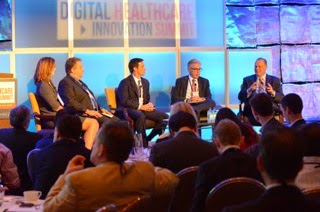- Public Policy
- Leadership
- Funding
- News & Events
- About the Center
Back to Top Nav
Back to Top Nav
Back to Top Nav
Back to Top Nav
Students reflect on the opportunities provided to them by the Rockefeller Center's Mini-Grants program through this ongoing series. The Mini-Grants program funds registration fees for students attending conferences relevant to the Rockefeller Center's mission as well as the costs of bringing speakers to the Dartmouth campus.
Heading into the Digital Healthcare Innovation Summit in early November, I didn’t fully know what to expect. I stepped in with only a desire to learn. Throughout the course of the summit, I had the opportunity to speak with numerous leaders in the digital health space and hear from a sampling of panelists and speakers that spanned the provider, patient, and payor landscape. It was a riveting day of big ideas and immense possibility. With the possibility of helping to re-imagine the patient- physician relationship and the boundaries of the clinic, digital health has seized the attention of investors, regulators, and health system leaders alike.
 |
|
Malay Gandhi facilitates a panel on insurer 2.0 and tech-enabled services.
|
The essence of the experience focused on connecting administrators and investors to the entrepreneurs and innovators looking to redefine and improve the status quo. Throughout the summit, attendees had ample opportunity to mingle as well as discuss. It was a foundation for conversations that would continue well past the adjourning address. I spoke with leading commentators in the health IT world over coffee. I listened to leading healthcare investors speak to their expectations for the changing industry. I was inspired by pioneers in digital health looking to simplify operations and improve access to basic needs, such as prescription glasses.
 |
|
Panel discusses patient engagement via mobile health.
|
The value of this day was a sense of promise that is central to involving a new generation with an area of high disruption that will come to affect each of us individually.
-Thomas Wang '16